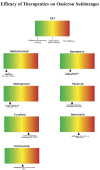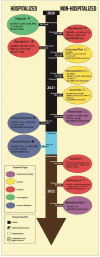Current Effective Therapeutics in Management of COVID-19
- PMID: 35807123
- PMCID: PMC9267414
- DOI: 10.3390/jcm11133838
Current Effective Therapeutics in Management of COVID-19
Abstract
The current pandemic due to the SARS-CoV-2 virus has caused irreparable damage globally. High importance is placed on defining current therapeutics for Coronavirus Disease 2019 (COVID-19). In this review, we discuss the evidence from pivotal trials that led to the approval of effective therapeutics in the treatment and prevention of COVID-19. We categorize them as effective outpatient and inpatient management strategies The review also attempts to contextualize the efficacy of therapeutics to the emerging variants. Vaccines, which remain the most effective prevention against hospitalization and deaths is not included in this review.
Keywords: Anakinra; COVID-19; Casirivimab plus imdevimab; Sotrovimab; anticoagulation; baricitinib; bebtelovimab; coronavirus disease 2019; corticosteroids; evusheld; molnupiravir; monoclonal antibodies; omicron; paxlovid; remdesivir; therapeutics; timeline; tocilizumab.
Conflict of interest statement
The authors declare no conflict of interest.
Figures
Similar articles
-
A Comprehensive Review on the Efficacy of Several Pharmacologic Agents for the Treatment of COVID-19.Life (Basel). 2022 Nov 1;12(11):1758. doi: 10.3390/life12111758. Life (Basel). 2022. PMID: 36362912 Free PMC article. Review.
-
Treatment with Sotrovimab and Casirivimab/Imdevimab Enhances Serum SARS-CoV-2 S Antibody Levels in Patients Infected with the SARS-CoV-2 Delta, Omicron BA.1, and BA.5 Variants.Infect Dis Rep. 2022 Dec 9;14(6):996-1003. doi: 10.3390/idr14060099. Infect Dis Rep. 2022. PMID: 36547245 Free PMC article.
-
COVID-19 treatments approved in the European Union and clinical recommendations for the management of non-hospitalized and hospitalized patients.Ann Med. 2022 Dec;54(1):2856-2860. doi: 10.1080/07853890.2022.2133162. Ann Med. 2022. PMID: 36259490 Free PMC article. Review.
-
An update on drugs with therapeutic potential for SARS-CoV-2 (COVID-19) treatment.Drug Resist Updat. 2021 Dec;59:100794. doi: 10.1016/j.drup.2021.100794. Epub 2021 Dec 9. Drug Resist Updat. 2021. PMID: 34991982 Free PMC article. Review.
-
Pharmacological treatment of COVID-19: an opinion paper.Rev Esp Quimioter. 2022 Apr;35(2):115-130. doi: 10.37201/req/158.2021. Epub 2021 Dec 11. Rev Esp Quimioter. 2022. PMID: 34894208 Free PMC article. Review.
Cited by
-
Efficacy and safety of oral antivirals in individuals aged 80 years or older with mild-to-moderate COVID-19: preliminary report from an Italian Prescriber Center.Infez Med. 2022 Dec 1;30(4):547-554. doi: 10.53854/liim-3004-9. eCollection 2022. Infez Med. 2022. PMID: 36482949 Free PMC article.
-
Early Access to Oral Antivirals in High-Risk Outpatients: Good Weapons to Fight COVID-19.Viruses. 2022 Nov 14;14(11):2514. doi: 10.3390/v14112514. Viruses. 2022. PMID: 36423123 Free PMC article.
-
A Clinical Update on SARS-CoV-2: Pathology and Development of Potential Inhibitors.Curr Issues Mol Biol. 2023 Jan 4;45(1):400-433. doi: 10.3390/cimb45010028. Curr Issues Mol Biol. 2023. PMID: 36661514 Free PMC article. Review.
-
Outpatient anti-spike monoclonal antibody administration is associated with decreased morbidity and mortality among patients with cancer and COVID-19.Clin Exp Med. 2023 Oct;23(6):2739-2748. doi: 10.1007/s10238-023-01019-y. Epub 2023 Feb 13. Clin Exp Med. 2023. PMID: 36780118 Free PMC article.
-
Repurposing an 'Old' Drug for the Treatment of COVID-19-Related Cytokine Storm.J Clin Med. 2023 May 10;12(10):3386. doi: 10.3390/jcm12103386. J Clin Med. 2023. PMID: 37240492 Free PMC article.
References
-
- CDC COVID Data Tracker. Centers for Disease Control and Prevention. [(accessed on 15 June 2022)]; Available online: https://covid.cdc.gov/covid-data-tracker/#datatracker-home.
-
- World Health Organization WHO COVID-19 Dashboard. World Health Organization. Published 2022. [(accessed on 16 June 2022)]. Available online: https://covid19.who.int/
-
- Mahamat-Saleh Y., Fiolet T., Rebeaud M.E., Mulot M., Guihur A., El Fatouhi D., Laouali N., Peiffer-Smadja N., Aune D., Severi G. Diabetes, hypertension, body mass index, smoking and COVID-19-related mortality: A systematic review and meta-analysis of observational studies. BMJ Open. 2021;11:e052777. doi: 10.1136/bmjopen-2021-052777. - DOI - PMC - PubMed
-
- Wang M., Cao R., Zhang L., Yang X., Liu J., Xu M., Shi Z., Hu Z., Zhong W., Xiao G. Remdesivir and chloroquine effectively inhibit the recently emerged novel coronavirus (2019-nCoV) in vitro. [(accessed on 18 May 2022)];Cell Res. 2020 30:269–271. doi: 10.1038/s41422-020-0282-0. Available online: https://www.ncbi.nlm.nih.gov/pubmed/32020029. - DOI - PMC - PubMed
Publication types
Grants and funding
LinkOut - more resources
Full Text Sources
Miscellaneous



